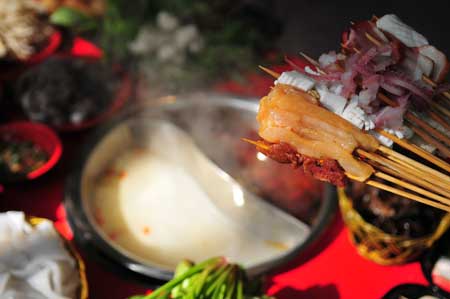Is danger really lurking in your hotpot?

A recent investigation by anhuinews.com revealed that many Chinese hotpot restaurants use unhealthy chemical additives to cut costs and enrich the flavor of their dishes. The investigation gave few details and was not very scientific, but it spotlighted the pressing issue of food safety.
Chinese restaurants outside China have been dogged by health-related controversies since they mushroomed in the U.S. in the 1970s. In those days the controversy revolved around monosodium glutamate or MSG, a food additive that was supposed to enhance the flavor of Chinese food and make it more suitable to the Western palate. But MSG was soon linked to health issues. Many scientific studies were carried out, but the results remained inconclusive. It seems that in high quantities MSG may cause health problems, but a normal intake is probably not harmful. Of course it is not only the U.S. that has a strict food safety policy. The European Union developed the "E" system to classify food additives. Studies revealed that most additives pass all food safety regulations, although some may affect consumers' health (and are banned in some countries). Some were classified as poisonous and strictly banned.
In Asia, food safety policy has historically been less strict. But this is changing, as countries, including China, adopt stricter food laws. And no matter where we find ourselves, food safety issues are not going to go away. As we know, when food is produced on an industrial scale it's not realistic to imagine that it can be 100 percent organic. We must recognize that, as in other industries, many manufacturers lower standards to increase their profits and maintain competitive prices. For food, this means less natural ingredients and more additives. At the outset, people may not be well-informed enough to realize the importance of the problem. But as was the case with smoking and environmental issues, the public soon learns to pay close attention to safety issues. The process started in the developed countries and is slowly spreading also across the world. But it will take time. Countries like China are still just discovering the "joy" of "fake" food and are still "enjoying" it without giving too much thought to the long term consequences.
But getting back to the initial problem, should we be worried by the investigation into hotpot restaurants? First of all, the report gave few details about the supposed dangers lurking in hotpots. Were they talking about new dangerous additives or just the "classic" MSG (which you can find in every supermarket and convenience store)? Were any real health problems traced back to these restaurants? We don't know the answers yet, but one thing is for sure – food safety remains an important problem in China as well as elsewhere. Cheap, tasty food usually involves many not-so-healthy-but-very-yummy ingredients, and not just in China.
Chinese cuisine, in its philosophy, is much healthier than many other cuisines around the world, but is also getting harder to get access to "the real thing" (and when we do, we might not like it that much). Chinese people probably still eat healthier than many other nations, but the fast-food mirage is gaining popularity fast. It shouldn't surprise us if, even if we avoid all the not-so-healthy oily kind of dishes, we still end up eating additives meant to enhance flavor. But I still think that a hotpot dinner is better than many other choices.
Bianca Chelu is a Romanian freelancer based in Hangzhou, the capital city of east China's Zhejiang Province.
Opinion articles reflect the views of their authors, not necessarily those of China.org.cn
 0
0 







Go to Forum >>0 Comments